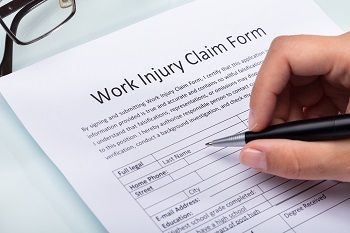TUESDAY, APRIL 27, 2021
To do your job, you might have to move around quite a bit during the day. Even if you primarily have a desk job, you won’t be entirely glued to your desk all day long. Therefore, any time you leave your desk or go off your company premises, then there is a chance that you could sustain an injury. As a result, you might find that you qualify for workers’ compensation insurance as a result of your injuries. your desk or go off your company premises, then there is a chance that you could sustain an injury. As a result, you might find that you qualify for workers’ compensation insurance as a result of your injuries.
While workers’ compensation benefits can provide financial assistance for work-related injuries, you still have to prove that the injury was indeed related to your working duties. As a result, this could cause some problems when it comes to claiming offsite injuries. However, your employer and your workers’ compensation insurer are happy to help you understand your benefits.
Understanding Workers’ Compensation
When employees get hurt on the job they are often entitled to assistance, which comes in the form of supplementary income and medical bill coverage provided by workers’ compensation insurance.
Suppose, for example, that an employee falls on the job and sustains a severe injury. Under the circumstances, they might be entitled to workers’ compensation, which can provide them with income support, medical bills, rehabilitation care and other recovery benefits. Some policies offer death benefits to survivors if the injured party dies.
Nearly all states require most or all businesses within their borders to carry workers’ comp insurance. However, each state structures its workers’ compensation regulations differently. Therefore, the type and amounts of benefits provided, along with the qualifying injuries, will vary from place to place and injury to injury. So, if you get hurt on the job, you will often have help available.
Qualifying for Workers’ Comp While Offsite
Doing your job is a fluid situation. After all, you aren’t a machine, and even when you complete routine tasks day in and day out, there are still going to be variations. Still, you don’t have to sit at a desk all day to complete these tasks, which is why you will often qualify for workers’ compensation even when you are offsite.
However, not all offsite injuries qualify an injured person for workers’ compensation. To receive any benefit, you must prove that your injury was related directly to your working duties. Given these parameters, certain offsite injuries will qualify, while others will not.
Let’s take a closer look at how different offsite injurie might qualify.
Remote Work
If you are a remote worker, then your business might be located in one place, but you perform your ordinary work in other locations. For example, if you are an IT consultant, then you might spend a lot of time working in different clients’ offices, helping them to fix problems in their computer systems.
Under these circumstances, you are still doing your job even though you aren’t at your primary office space. Therefore, an injury that occurs at this time might qualify for workers’ compensation. Keep in mind, even if you get hurt on another business’s premises, your employer’s workers’ compensation insurance can likely still apply.
Work-From-Home Employees
If you are working from home—which the majority of Americans have had to do for the last year—then you have had to adjust to working in an environment that is different from that of the average office. However, working from home still qualifies as work. Therefore, you will often still qualify for workers’ compensation.
However, you will still have to prove that this injury occurred due to your working duties. In a home environment, this might be a bit tricky. Talk to your employer and workers’ compensation insurer to learn more about this benefit.
Driving Injuries
If you are driving to or from work, then you will not qualify for workers’ compensation. However, if you are driving for work, then you can often still qualify. If your employer dispatches you on an errand (whether in a company car or a personal car) and you get injured in an accident, then you will usually qualify for workers’ compensation.
Work Events & Recreation
If you attend a company-sponsored event, then injuries occurring at that event will often qualify you for workers’ compensation. Even recreational events like lunches, sporting events or outings can be considered qualifying under the right circumstances However, happy hours and unofficial outings will not generally qualify the worker for coverage.
Personal Lunches
Qualifying for workers’ compensation while on your lunch break can be a bit confusing. If you get injured in the company lunchroom or while eating at your desk, then you will generally qualify for benefits. You were onsite at the time the injury occurred.
However, if you get injured while eating lunch offsite, then you generally won’t qualify for coverage; this action is not related to your working duties. Still, if you are attending a business luncheon, or are picking up food for a coworker or your boss, you might still be able to file for workers’ comp.
Don’t hesitate to talk to your employer about the way an injury offsite can receive benefits.
No Comments
Post a Comment |
|
Required
|
|
Required (Not Displayed)
|
|
Required
|
All comments are moderated and stripped of HTML.
|
|
|
|
|
|
NOTICE: This blog and website are made available by the publisher for educational and informational purposes only.
It is not be used as a substitute for competent insurance, legal, or tax advice from a licensed professional
in your state. By using this blog site you understand that there is no broker client relationship between
you and the blog and website publisher.
|
Blog Archive
2025
2024
2023
2022
2021
2020
|